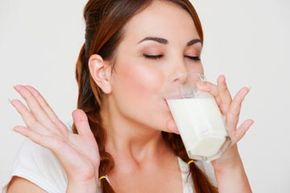If the relationship between dairy and fertility was categorized on a social media page, it would likely be slugged "it's complicated." Thousands of women and hopeful couples wouldn't flock to infertility specialists each year if adding or subtracting a glass of milk was a miracle cure. But there's a small body of research that clarifies the influence of milk and milk byproducts on fertility.
There is a proven connection between a woman's Body Mass Index (BMI) and fertility. Unhealthy body weight -- either too high or too low -- can disrupt the menstrual cycle, complicating or preventing a pregnancy [source: Institute for Reproductive Health]. This is where we find the indirect link between dairy and fertility. Naturally, an obese or overweight woman who's eating a diet high in calories can increase her odds of becoming pregnant by reducing her intake of high-fat dairy. Likewise, an overly skinny woman seeking to get pregnant would be better served to eliminate skim milk and consider adding whole milk products to her diet. But the connection between dairy and fertility goes deeper.
Advertisement
Limited research seems to indicate that whole milk products positively affect fertility if that intake is reasonable -- say, one or two glasses (4.5 deciliters) of milk a day or half a cup (118 grams) of ice cream twice a week [sources: Chavarro; Institute for Reproductive Health]. Some doctors suggest that two servings of whole milk dairy products each day can lead to a whopping 25 percent increase in a woman's odds of becoming pregnant [source: Curtis. At the same time, other infertility specialists recommend the complete elimination of dairy from the diet due to concerns about growth hormones, pesticides and viruses [source: Dunne]. Opinions vary on the issue of dairy and its affect on fertility. Ask your physician about his or her conclusions on the matter and what they're based upon.
The role of low-fat milk in pregnancy is, in some ways, a separate issue. Click ahead to learn more.
Advertisement
